There Is No “Demand for Ethanol” if the Government Has to Make People Use It

This quote, from a news story about the woes the ethanol industry is facing, has to be one of the least self-aware comments I’ve read in a while:
“The demand for ethanol is there. If you look at the RFS, the demand for ethanol is supposed to be 15 million gallons of corn-based ethanol. That’s what the law says. The small refinery waivers deviate from that law,” said Gerald Bachmeier, Red Trail Energy, LLC.
Industry leaders point their fingers at the EPA and an increase in Small Refinery Hardship Waivers, which allow companies to not blend ethanol into gasoline. These waivers have exempted more than 4 billion gallons of ethanol from being used.
When we talk about a marketplace, it’s a reference to the exchange of goods and services between people who supply them to people who want them.
I don’t think that term applies to the ethanol industry, because while there are certainly people making the stuff, there are not a lot of people who actually want it.
Mr. Bachmeier says, “the demand for ethanol is there,” but goes on to bemoan waivers exempting refiners from legal mandates to use ethanol.
That’s not demand.
Demand comes from people who want to use your product.
It does not come from people who are forced to use it by the government and, when given a choice, choose not to use it at all.
The article mentions the trade war with China as another factor in the struggles ethanol is facing. “Last Summer, China placed a 70% tariff on U.S. Ethanol, putting pressure on an already volatile international market,” it states.
I’m not sure how much that’s really a factor, though. According to the Renewable Fuels Association, only a little more than 10 percent of all ethanol produced in the U.S. was exported in 2018, and of that total, only about 3 percent went to China.
Can a tariff on the 3 percent of the 10 percent of exported ethanol which goes to China really be having this big an impact on the ethanol industry? I’m dubious.
More likely is that the market for ethanol is a house of cards built by politicians looking to buy votes in farm country. Ethanol is a product that has been promoted by the federal government, not to mention various state governments, for decades now. As painful as it is – and it would be painful since more than a quarter of America’s corn crop, our nation’s largest crop by a country mile, is sold to the ethanol industry – it may be time to let ethanol live (or more likely die) on its own merits.




